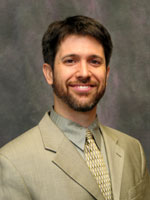ECE Professor Provides Students with Unique Opportunities to Build Real-World Systems
 |
Dr. Steven C. Reising |
Since arriving at Colorado State University in the fall of 2004, Dr. Steven C. Reising has been making waves.
Dr. Reising, an associate professor in the Department of Electrical and Computer Engineering, is currently leading research in the areas of microwave radiometer and radar systems and RF integrated circuits for sensing the earth's environment from a distance. What makes his work truly unique, however, is the wealth of innovative opportunities he is making available to his students. These opportunities are having a ripple effect on engineering education at CSU: students are being prepared for industry positions in millimeter wave imaging using radar or its passive cousin, radiometry.
Dr. Reising and his students are using passive radars, or radiometers, to study waves in the atmosphere and oceans from a variety of vantage points. Funded by NSF and by a joint partnership of the National Oceanic and Atmospheric Administration (NOAA), the Department of Defense and NASA, the goal of Dr. Reising's research is to improve the next generation of satellites to observe both hazardous weather and our changing climate. He shares, "The advantage of using microwave and millimeter waves is that we can observe the earth's surface through nearly all weather conditions."
Soon after his arrival in the College of Engineering, Dr. Reising founded the Microwave Systems Laboratory, in which students design and build microwave and millimeter-wave systems. At times laboratory research in engineering requires students to focus their attention on one particular aspect, or building block, of a major system. However, students in the Microwave Systems Laboratory are experiencing a very different approach to learning; they are building complete systems and then deploying them in the field, to learn to improve methods of observing changes in the Earth's environment. "My students design the entire system, end-to-end, from the antenna input to the Ethernet output," shares Dr. Reising. "They build microwave sensors and operate them in field experiments to study the relationship between what the sensors measure and changes in the atmosphere and the oceans. To gain that experience is not common in graduate school."
Sharmila Padmanabhan, a Ph.D. student who currently works with Dr. Reising in the Microwave Systems Laboratory, is learning a great deal from her involvement with the design, fabrication and deployment of receiver systems for remote sensing applications. She notes, "System design, especially at high frequencies, is exciting. It involves learning how to integrate all of the individual RF components and designing efficient data acquisition, power distribution, and temperature control subsystems. This lab offers an awesome research experience to any student looking to pursue challenging graduate work."
Eve Klopf, an M.S. student who works with Dr. Reising, shares, "I've been able to gain a solid understanding of all parts of the instrument development process, and I've also had the opportunity to present at a professional conference." She adds, "The Microwave Systems Laboratory is an enjoyable place to work, and I'm glad that I decided to come here to pursue my master's degree."
In addition to weather and climate, Dr. Reising and his students are developing new technology for miniaturizing microwave sensing systems. As an example, they are working with NASA to miniaturize satellite sensors to reduce their volume, weight and cost.
Dr. Reising's work on the miniaturization of this technology is transferable to some everyday applications as well. He notes, "Within the next few years, many of the vehicles that we commonly purchase will have the option to include a millimeter-wave radar. This 'collision avoidance radar' can be combined with cruise control to automatically reduce the speed of your vehicle if you are getting too close to the vehicle in front of you. It can also warn you if you are about to back up into a grocery cart."
Dr. Reising and his students are definitely making waves, and it is likely that their work will impact lives around the world in ways that are unimaginable today.
Dr. Reising may be contacted by e-mail or by phone at (970) 491-2228. Additional information regarding his background and research is available on his website.
To learn more about supporting the College of Engineering, its departments and its programs, visit www.SupportEngineering.colostate.edu or call (970) 491-7028.